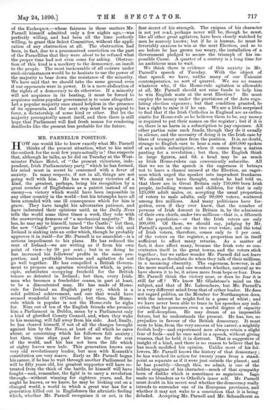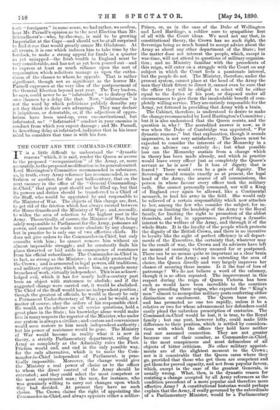MR. PARNELL'S POSITION.
HOW one would like to know exactly what Mr. Parnell thinks of the present situation, what to his mind the outlook for the next few years actually is ! One suspects that, although he talks, as he did on Tuesday at the West- minster Palace Hotel, of "the present victorious, inde- pendent, Irish Parliamentary party" which he has formed. his mind must in secret be consumed with a fever of anxiety. In many respects, if not in all, things are not going well with him. He has won many victories of a kind, the greatest, perhaps, being his recognition by a great number of Englishmen as a patriot instead of an enemy—a victory which would have been impossible in any other country in the world—but his triumphs have all been attended with one ill consequence which for him is grave. They have taught his adversaries patience, and have indurated their opinions until, as the Daily New tells the world some three times a week, they vote with the unswerving firmness of "a mechanical majority." He has, he may say to himself, tamed "the Castle ;" but then, the new " Castle " governs far better than the old, and Ireland is sinking into an order which, though he probably approves it in itself—for Mr. Parnell is no anarchist—is a serious impediment to his plans. He has reduced the rent of Ireland—we are writing as if from his own point of view—by 30 per cent. ; but in so doing he has increased his followers' profits in the same pro- portion, and profitable business and agitation do not go well together. He has compelled a British Govern- ment to propose an agrarian revolution which, in prin- ciple, substitutes occupying freehold for the British tenure so detested in Ireland ; but then, every Irish- man who becomes a freeholder ceases, in part at least, to be a discontented man. He has made of Home- rule for Ireland an English party cry, which is a solid political achievement, and one that would have seemed wonderful to O'Connell; but then, the Home- rule which is popular is not the Home-rule he sighs for. Nine out of ten of the English friends who promise him a Parliament in Dublin, mean by a Parliament only a kind of glorified County Council, and, when they wake to his meaning, will fall away from his side. And, finally, he has cleared himself, if not of all the charges brought against him by the Times, at least of all which he cares about, or concerning which his followers felt anxiety ; but then, time slips past for him as for the rest of the world, and his has not been the life which at eighty leaves men bale. This generation knows one very old revolutionary leader, but men with Kossuth's constitution are very scarce. Early as Mr. Parnell began his career, if he has to wait through another Parliament he will be fifty years old, his greatest supporter will have re- treated from the thick of the battle, he himself will have fought—and, remember, the fight is to carry a revolution through—without winning for eighteen years, and, for aught he knows, or we know, he may be looking out on a changed world, a world in which a great war has for a generation killed out in Englishmen the altruistic feeling which, whether Mr. Parnell recognises it or not, is the first Fiecret of his strength. The enigma of his character is not yet read, perhaps never will be, though he must, like all other great agitators, have been closely watched by men he scarcely knows ; but if he is human, he must be feverishly anxious to win at the next Election, and so to see before he has grown too weary, the installation of a Government pledged to secure the triumph of his im- possible Cause. A quarter of a century is a long time for an ambitious man to wait.
We think there is evidence of this anxiety in Mr. Parnell's speech of Tuesday. With the object of that speech we have, unlike many of our Unionist contemporaries, no sort of quarrel. We see no reason whatever why, if the Home-rule agitation is allowable at all, Mr. Parnell should not raise funds to help him to win English seats at the next Election? He must employ the money under the provisions of the Acts regu- lating election expenses ; but that condition granted, he has a right to raise it if he can. We are a little surprised to find that if the Irish Catholics in England are as enthu- siastic for Home-rule as he believes them to be, any money is required to put their names on the register ; but if it is so, there is no harm in a subscription to pay expenses. Alll other parties raise such funds, though they do it usually in silence, and the necessity of doing it in the Irish case by blare of trumpet arises from the position. It is, no doubt, strange to English ears to hear a sum of X60,000 spoken of as a noble subscription, when it comes from a nation panting for a revolution ; but then, the English think in large figures, and 6d. a head may be as much as Irish Home-rulers can conveniently subscribe. All that we see in the speech is the eagerness it betrays not to leave a chance unused at the Election, an eager- ness which urged the speaker into imprudent frankness. We should not have thought, unless he had told us, that there are in Great Britain only 750,000 born Irish people, including women and children, for that is only 125,000 adult males, or, accepting the usual proportion. of voters to male adults, only 90,000 voters, scattered among five millions. And many politicians have for- gotten, even if they ever knew, that the number of persons of Irish descent in Britain is, by the admission of their own chiefs, under two millions—that is, a fifteenth of the population—or that the Irish voters are only 300,000. Of these, we should say, judging by Mr. ParnelPs speech, not one in two ever votes ; and the total of Irish voters, therefore, comes only to 3 per cent. of the voters on the register, a proportion not in itself sufficient to affect many returns. As a matter of fact, it does affect many, because the Irish vote so con- centrates itself in the great towns, and the voters stick together ; but we rather wonder Mr. Parnell did not leave the figures, as Socialists do when they talk of their millions, in a menacing obscurity. The eagerness, however, is all the more marked, and one wonders whether, natural as we have shown it to be, it arises more from hope or fear. Does Mr. Parnell think the victory near, or does he fear it is still far off ? We know Mr. Gladstone's mind on the subject, and that of Mr. Labouchere, but Mr. Parnell's. is a very different mind from that of either leader. He does. not regard politics, as the Member for Northampton does.. with the interest he might feel in a game of whist ; and we have never been able to trace in his speeches any indi- cation that he possesses even a useful degree of capacity for self-deception. He may dream of an impossible future, but he understands the present. He has, too, no prejudice in favour of the British democracy. It must seem to him, from the very success of his career, a mightily foolish body—and experienced men always retain a slight fear of fools—and he once said in a. speech, without giving reasons, that he held it in distrust. That is suggestive of insight of a kind, and there is no reason to believe that he has much modified his opinion. Unlike most of his fol- lowers, Mr. Parnell knows the history of that democracy ; he has watched its action for twenty years from a stand- point as separate as if it were just outside the planet ; and he has possibly—though this, we admit, is one of the hidden enigmas of his character—much of that sympathy born of dislike which is sometimes so sagacious. Iago made no blunders as to Othello's inner self. Mr. Parnell must doubt in his secret soul whether the democracy really intends to surrender one of its European provinces, and whether it may not wake to a conviction that it is being deluded. Accepting Mr. Parnell and Mr. Schnadhorst as both " foreigners " in some sense, we had rather, we confess, hear Mr. Parnell's opinion as to the next Election than Mr. Sehnadhorst's—who, by-the-way, is said to be growing Imperialist at the Cape—and should not be at all surprised to find it oue that would greatly amaze Mr. Gladstone. At all events, it is one which induces him to take time by the forelock, to make a strong appeal for funds in a quarter as yet untapped—the Irish wealth in England must be very considerable, and has not as yet been poured out—and to express at least as much reliance upon the sort of organisation which solicitors manage as upon the enthu- siasm of the classes to whom he appeals. That is rather significant, though not so significant as the horror Mr. Parnell expresses at the very idea of the postponement of the General Election beyond next year. The Tory leaders, he says, could never be so " infatuated " as to destroy their own chances by a delay like that. Now, " infatuation " is not the word by which politicians publicly describe any act they think to their own advantage. They may declare it iniquitous, or detestable, or, if the adjectives of oppro- brium have been used-up, even unconstitutional, but infatuated, no ! " Infatuated " conduct in your enemies is conduct from which you expect damage ; and Mr. Parnell, in describing delay as infatuated, indicates that in his inner mind he considers that time is with his foes.



































 Previous page
Previous page